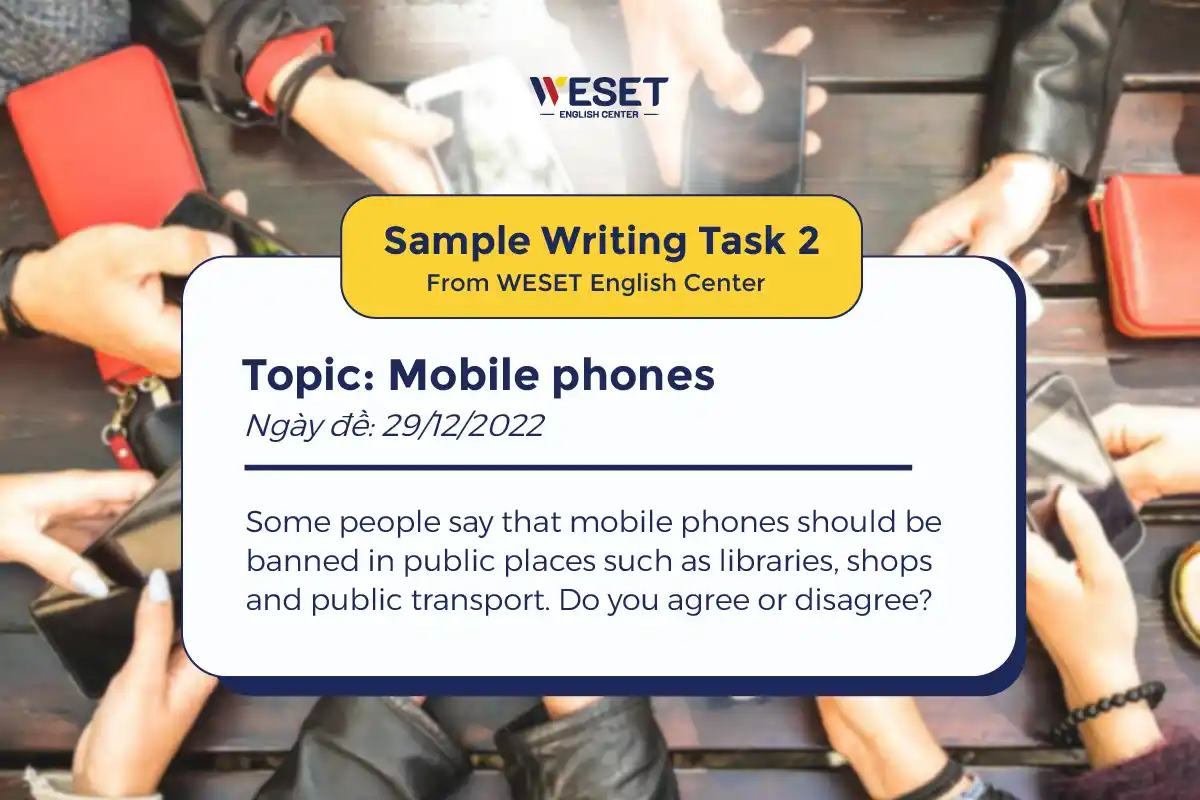Giải đề mẫu Writing Task 2 | Chủ đề: Mobile phones
- WESET
- Bài mẫu IELTS Sample Writing, Bài mẫu Task 2 IELTS Writing sample, Bài thi IELTS mẫu, Blog, Blog IELTS
MỤC LỤC
Điện thoại gần như là vật bất ly thân của giới trẻ nhưng nếu chúng bị cấm không được mang vào những nơi công cộng thì bạn có đồng tình không? Hãy cùng WESET thảo luận về quan điểm này qua một đề thi IELTS Writing Task 2 nhé.
Đề bài: Some people think that the use of mobile (cell) phones should be banned in public places such as libraries and shops and on public transport. To what extent do you agree or disagree with this statement?

Đề thi IELTS Writing Task 2 nêu quan điểm về việc sử dụng điện thoại nơi công cộng
1. Outline
Intro: Paraphrase đề bài và khẳng định quan điểm không đồng tình
Body 1: Đưa ra một vài lí do vì sao lại có đề xuất cấm điện thoại di động ở nơi công cộng
– Một số nơi có đề ra quy tắc ứng xử riêng:
- Khi ở trong thư viện → tiếng chuông điện thoại có thể bị xem là gây phiền hà; .
- Không cho khách đến rạp phim mang điện thoại có camera theo để tránh vi phạm bản quyền phim
– Điện thoại có thể gây hại ở bệnh viện, ví dụ nó gây nhiễu máy trợ tim.
Body 2: Đưa ra lí do vì sao không nên cấm điện thoại ở nơi công cộng
– Đời sống và công việc của con người liên quan mật thiết đến các chức năng của điện thoại: thay vì cấm hẳn điện thoại (điều mà hầu hết nơi công cộng không cấm) thì người dùng có thể tắt tiếng để không gây phiền hà.
– Cần điện thoại để liên lạc trong đời sống hằng ngày và trong những trường hợp khẩn cấp: nhân viên y tế trong bệnh viện vẫn được phép sử dụng điện thoại.
Conclusion: Khẳng định lại quan điểm không đồng ý với đề bài
2. Sample
Opinions are divided on whether cell phones should be prohibited in public spaces. Personally, I think that a complete ban on this versatile device is unreasonable and that certain restrictions on usage are more advisable.
On the one hand, opponents of the ban claim that cell phones can be intrusive in public areas for some reasons. Firstly, there are particular places in which people have certain expectations of the environment and code of conduct. For example, mobile phones are considered disturbing in libraries because their notification sounds can disturb those requiring a quiet working environment, or banning phones with camcorders in cinemas is to prevent audiences from violating copyright laws. Another common argument for prohibiting mobile phone usage in public areas is that it might interfere with particular medical electronic devices, such as pacemakers. Banning mobile phones in such places is arguably a coherent policy if this could propose a valid threat.
On the other hand, I would argue that prohibitive measures on mobile phones on public premises can prove injudicious to enforce for two reasons. First, the mobile phone is an essential tool that has been integrated into modern human life. The device has been developed to fulfill a variety of human needs, from serving as a recorder, a camera, and a calendar to a music player and even an encyclopedia with the power of the Internet. Public places with strict regulations against distraction, like libraries, still allow functions without external sounds. People could put their phones on vibration mode, take pictures without the shutter sound and listen to music using earphones. Second, there are many situations where people need to be available constantly. It could be a job-related or family-related emergency that necessitates their presence immediately. Even in hospitals, both patients and medical staff use mobile phones to communicate. The former may have to contact their relatives, while the latter may require the devices for effective inter-staff communication.
In conclusion, while suitable restrictions on mobile phone use in public spaces are necessary to avoid causing problems for others, I still maintain that this multi-purpose technology should not be completely prohibited but used with respect for others instead, after considering its utility and permeation. (365 words)
3. Vocabulary
- Code of conduct (n): A set of values, rules, standards, and principles outlining what employers expect from staff within an organization
- Pacemaker (n): Máy trợ tim
- A shutter sound: A digital sound the camera makes when you shoot a photo
- Permeation (n): The fact of affecting every part of something → The growing permeation of online social networks in our everyday life
Có thể bạn quan tâm
Giải đề mẫu Writing Task 2 – Ngày 09/04/22 | Chủ đề: Learning languages
Giải đề mẫu Writing Task 2 – Ngày 09/07/2022 | Chủ đề: Sports (Thể thao)
Giải đề mẫu Writing Task 2 – Ngày 19/03/2022 | Chủ đề: Foreign languages






